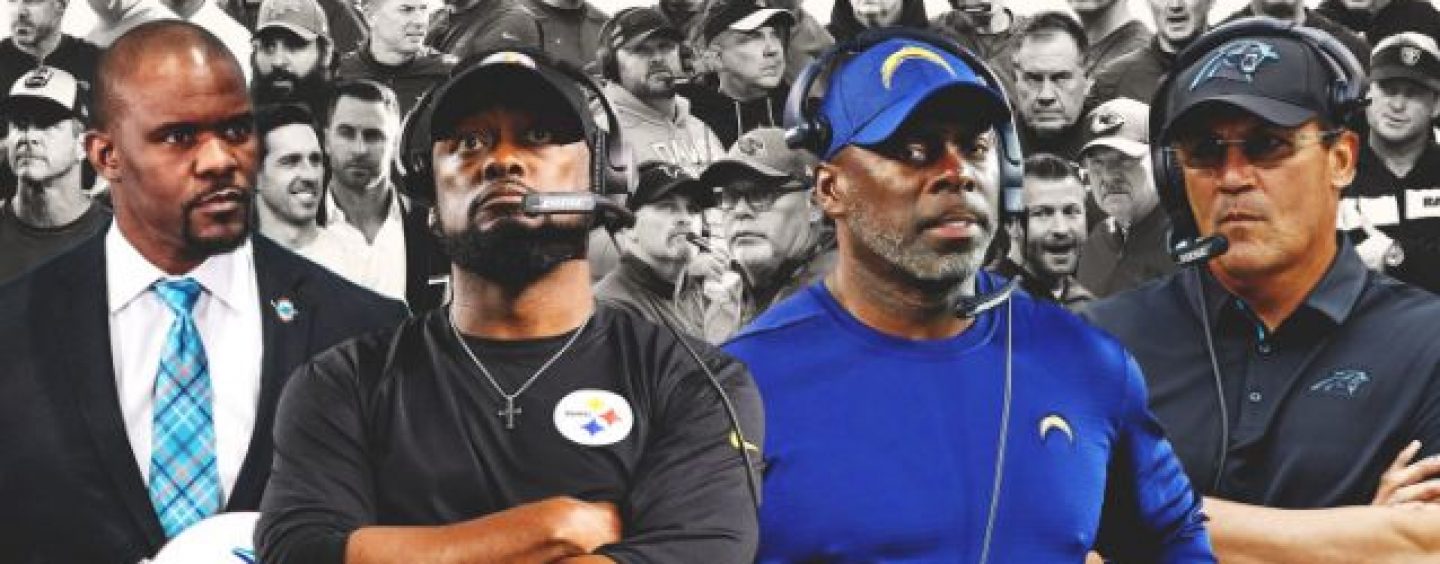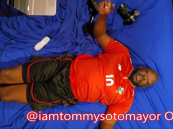
Why The NFL Continues To Not Hire Black Head Coaches & What Should Be Done To Change This By Blacks! (Video)
by Tj Sotomayor January 9, 2020 0 commentsSad But True!
By: Tommy “Tj” Sotomayor
The question hung in the air for several beats, catching each recipient off-guard.
The in-person inquiries were met with blank stares and stammers, while text-message replies contained emojis conveying the same level of uncertainty.
Within a fraternity of former players and scouts who have made their living identifying the best talent in the country, many continue to struggle with pinpointing one type of prospect in particular:
A rising — black — offensive mind among the college ranks.
In an offseason in which college quarterback gurus such as Lincoln Riley and Kliff Kingsbury topped the wish lists of NFL teams searching for the next Sean McVay, several people in NFL circles— ranging from general managers, de facto assistant GMs, personnel executives and scouts — struggled to name a single black coach who is an up-and-coming hotshot on the offensive side of the ball.
A general manager, fresh on the heels of completing his own round of head-coaching interviews this offseason, replied: “Great question. The one issue in football today is there is not enough black offensive coaches. We need to work on this.”
A few days later, that same GM forwarded the names of five college head coaches of color: Jay Norvell (Nevada), Mike Locksley (Maryland), Dino Babers (Syracuse), David Shaw (Stanford) and James Franklin (Penn State).
He had devised his list after doing a Google search.
The NFL’s hiring system is clearly broken when talent evaluators are relying on Internet searches to point them in the direction of highly skilled, melanin-complected coaches.
This offseason there were eight vacancies.
Only one of those hires was a minority: Brian Flores.

Something is deeply flawed in the process when a college coach can be fired for a 35-40 record — despite working with Baker Mayfield and the league’s reigning MVP, Patrick Mahomes — and then get an NFL head-coaching gig without having served as an offensive coordinator or assistant in the league. Meanwhile, a respected veteran like Jim Caldwell is terminated after back-to-back 9-7 seasons and replaced by Matt Patricia, who went 6-10 in his first season.
There is a clear undercurrent of unfairness that permeates the NFL when Zac Taylor and Matt LaFleur’s proximity to McVay is seen as a notable justification for a head-coaching consideration.
But the ability to identify deserving coaches of color is only one aspect of a multilayered epidemic. The heart of the issue is far more simple, and yet all the more damning: NFL team owners and GMs only hire who they feel most comfortable with, and oftentimes, that level of ease is less about intellect and ability, and more about cultural similarities.
The NFL is a microcosm of society, and it remains the old boy network it always was — a place where friends hire friends, lineage can carry more weight than it should and the people with the power to affect change routinely promote what they’re used to seeing in the mirror.
While some NFL assistants are forced to work their way up, toiling for years to prove that they’re capable of being a leader (See: Anthony Lynn of the Los Angeles Chargers), others are easily given the benefit of the doubt and immediate faith to restore a franchise (See: Kingsbury, Taylor, LaFleur).
Steve Wilks, who is black, was fired by Arizona after one season and replaced by an inexperienced Kingsbury. Eric Bieniemy, an intelligent, highly gifted and black offensive coordinator for the Chiefs was denied a head-coaching opportunity last month because teams questioned his lack of play-calling experience. Yet, his predecessors in Kansas City, Doug Pederson and Matt Nagy, both were hired to be head coaches after serving as Andy Reid’s offensive coordinators.
The criteria used to vet head-coaching candidates is arbitrary.
It’s not about who can do the job. It’s about who front-office executives want to do the job, and worse, the exceptions they’ll make for those coveted candidates.
That’s not a new fact. It’s just more blatant than ever.
It’s a sobering reality that is talked ad nauseam among most black coaches and personnel executives who see a clear lack of opportunities and an unclearpath to meaningful changes in lazy hiring practices.
While there isn’t a consensus among black assistants, scouts and personnel men about how to fix the problem, there is agreement that there aren’t enough minority candidates getting a chance to prove themselves.
And the lack of opportunities isn’t relegated to just the coaching ranks.
- There are only two minority owners in the league (Jacksonville’s Shad Khan and Buffalo’s Kim Pegula, who co-owns the Bills with her husband).
- Chris Grier (Miami Dolphins) is now the only black GM.
- There are currently only four head coaches of color (Lynn, Mike Tomlin, Ron Rivera and Flores) among 32 teams.
- There are only two black offensive coordinators in the league: Bieniemy and 39-year-old Byron Leftwich.
- Newly hired Tampa Bay head coach Bruce Arians is the only head coach whose offensive, defensive and special teams coordinators are all black.
Said one executive, who, like many others, spoke to Yahoo Sports on the condition of anonymity: “Bruce is rare. He has been around it. He sees the big picture of everything that happens in this business. We could only hope for others like him.”
The #WellActually and #WhatAbout crowds will undoubtedly argue, “Well, if they were better coaches, they wouldn’t have been fired! Stop making everything about race!” But that’s a take that’s both disingenuous and myopic.
The same ills that permeate society — racism, prejudice, disproportionate opportunities for people of color vs. whites — are reflected in business. And the NFL is big business.
Black coaches who underperform consistently deserve to be fired. But there’s something amiss when a sharp mind like Bieniemy is passed over by multiple teams. There’s something inherently broken in a system where Wilks is hired and fired within a calendar year and replaced by a college coach who leapfrogged over dozens of worthy candidates because of his reputation as a quarterback whisperer.

The McVay effect
Trends change.
Years ago, defensive minds were en vogue. But with the league moving in an offensive direction for some time, there has been a shift in how organizations calculate worthy head-coaching candidates.
Two years ago, people wondered if a 30-year-old McVay, a former tight ends coach and offensive coordinator for the Washington Redskins, was ready to lead his own locker room.
In 2018, the $100 million contract bestowed upon Jon Gruden after almost a decade in the broadcast booth raised eyebrows and questions about the Raiders’ commitment to winning.
And this offseason’s hiring cycle featured a rise of inexperienced offensive minds who will be tasked with either grooming a young, franchise quarterback or designing a prolific offense that can keep pace with Reid’s Chiefs and McVay’s Los Angeles Rams.
In a copycat league, the fascination with McVay led teams on a quest to find their own imitation. And a coach’s proximity to the quarterback is all that matters.
As one executive said: “If you don’t get in any quarterback rooms, you’re not going to be a head coach, whether you call a play or not.”
The person who touches the ball on every snap is the key to every team’s postseason chances. So it’s understandable that NFL teams were focused on finding head-coaching candidates who can properly teach, lead and convey what they need from him. In theory, offensive gurus can unlock potential that could prove invaluable to a franchise.
But far too often, up-and-coming black coaches don’t get the chance to be coordinators.
And if you don’t get the opportunity to be a coordinator, it’s unlikely you’ll get the chance to be a head coach.
Failure on many fronts
The league is not oblivious to the issue.
Commissioner Rogers Goodell was forced to address the lack of minority coaches and coordinators at his Super Bowl LIII news conference in Atlanta.
“We don’t look at the success or failure of the Rooney Rule in one-year increments,” he said, adding that the NFL has placed an emphasis on expanding its pipeline of minority coaches, specifically at the offensive coordinator and quarterbacks coach position. “We believe that is something that is critical for us moving forward, to continue the progress we’ve already had.”
The Rooney Rule — which mandates that at least one diverse candidate be interviewed for each head-coaching vacancy — was modified a few months ago to ensure its effectiveness. Under the new enhancements, clubs must interview at least one diverse candidate from the league’s Career Development Advisory Panel list or a diverse candidate not currently employed by the club; and teams must continue best practice recommendation of considering multiple diverse candidates.
There also is the NFL career development symposium, as well as other league initiatives such as, the Bill Walsh Minority Coaching Fellowship and the Nunn-Wooten Scouting Fellowship, which exposes former players to scouting careers in professional scouting.
In June, Morehouse College will host a “quarterback summit” aimed at mentoring young coaches.
But laziness and a lack of transparency and accountability will continue to undermine any efforts to even out the playing field for black coaching candidates.
There are plenty of qualified black offensive minds already in the NFL and at the college level. But those entrusted to make the best hires need to recognize their shortcomings and expand their range of vision to challenge the status quo.
When Google searches are necessary to identify talent, it’s evident that minority offensive minds aren’t being discussed enough in NFL circles.
“Can’t think of any,” one personnel executive casually said. “But that doesn’t mean they aren’t out there.”






No Comments so far
Jump into a conversationNo Comments Yet!
You can be the one to start a conversation.Only registered users can comment.